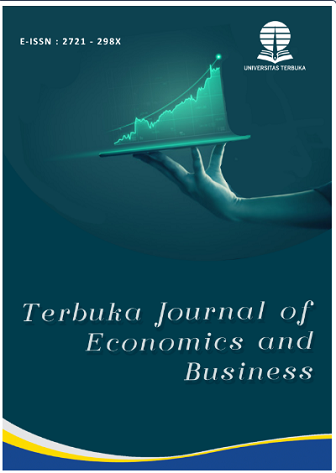I Increasing Satisfaction and Repurchase Intention on Contemporary Food and Beverages Through E-commerce
-
DOI:
https://doi.org/10.33830/tjeb.v4i1.4880Keywords:
utilitarian shopping value, hedonic shopping value, repurchase intention, satisfactionAbstract
This study aims to analyze consumption behavior using 2 categories of consumer behavior, namely utilitarian shopping value and hedonic shopping value. Utilitarian shopping value and hedonic shopping value to increase satisfaction and repurchase intention in the contemporary food and beverage business through e-commerce. Nowadays, food and drink are not only basic needs but also a part of a lifestyle. The food industry is currently growing rapidly. According to data from the Ministry of Industry, the food and beverage industry is one of the important sectors that supports the performance of the non-oil and gas processing industry. In addition, the food and beverage industry is one of the sectors that receive development priorities according to the Making Indonesia 4.0 roadmap. Food and beverage products in great demand are various processed drinks made from coffee or tea, korean snacks, and others. These food and beverage products are also easy to obtain by purchasing online. Therefore, this condition becomes something interesting to observe, especially on consumer behavior. This research is quantitative analsys. This research using SEM PLS. The result of this study shows that hedonic shopping value, utilitarian shopping value, and satisfaction influences repurchase intention on an online contemporary foods and beverages. The biggest influence on the repurchase intention of contemporary food and beverages is hedonic shopping value. This study develops previous research, but in this study, it covers many food and beverage products. Respondents in this study were also from all over Indonesia.
References
Andriani, Nova, Mugiyono, Mintarti Rahayu. (2021). Utilitarian Shopping Value And HedonicShopping Value To Improve Customer Satisfaction And Repurchase Intention On E-Commerce Business. Jurnal Aplikasi Manajemen (Journal of Applied Management) JAM Volume 19 Number 1 March 2021
Babin BJ, Attaway JS. (2000). Atmospheric Affffect as a Tool for Creating Value and Gaining Share of Customer. Journal Business Research Vol. 49(2) pp 91–99.
Babin B, Darden W dan Griffiffiffin M. (1994) .Work and /or Fun : Measuring Hedonis and utilitarian shopping value. Journal of Consumer Research Vol 20 pp 644-656.
Hair, Joseph F., William C. Black., Barry, J Babin dan Rolph, E Anderson (2010). Multivatriate Data Analysis A Global Perspective. Sevent Edition. Pearson: New Jersey.
Hartono, Jogiyanto. (2012). Metodologi Penelitian Bisnis: Salah Kaprah Dan Pengalaman Pengalaman. Yogyakarta: BPFE.
Hanzaee, Kambiz Heidarzadeh dan Rezaeyeh, Saber Porgham. 2013. Investigation of The Effects of Hedonic Value and Utilitarian Value on Customer Satisfaction and Behavioural Intentions. African Journal of Business Management, 7(11), pp: 818-825
Heijden, Hans Van Der. (2004). User Acceptance of Hedonic Information Systems. MIS Quarterly Vol 28 (4) pp. 695-704
Hirschman, E. C. and M.B. Holbrook. (1982). The Experiential Aspects of Consumption: Consumer Fanta-sies, Feelings, and Fun. Journal of Consumer Research. Vol. 9, No. 8, page 40-132.
Holbrook, M. B.,. (1986). The Role of Affect in Consumer Behaviour: Emerging Theories and Applications. Lexington, Heath, MA
Kotler, Philip and Armstrong, Gary. (2012). Principles of Marketing. New Jersey: Prentice Hall
Swari, Ni Luh Ade Purnami dan Giantari, I Gusti Ayu Ketut. (2017). Peran Kepuasan Konsumen Memediasi Hubungan Nilai Utilitarian Dan Nilai Hedonik Dengan Loyalitas Konsumen. E-Jurnal Manajemen Unud, Vol. 6, No. 3, 2017: 1194-1220
Downloads
Published
How to Cite
License
Copyright (c) 2023 Terbuka Journal of Economics and Business

This work is licensed under a Creative Commons Attribution-ShareAlike 4.0 International License.




